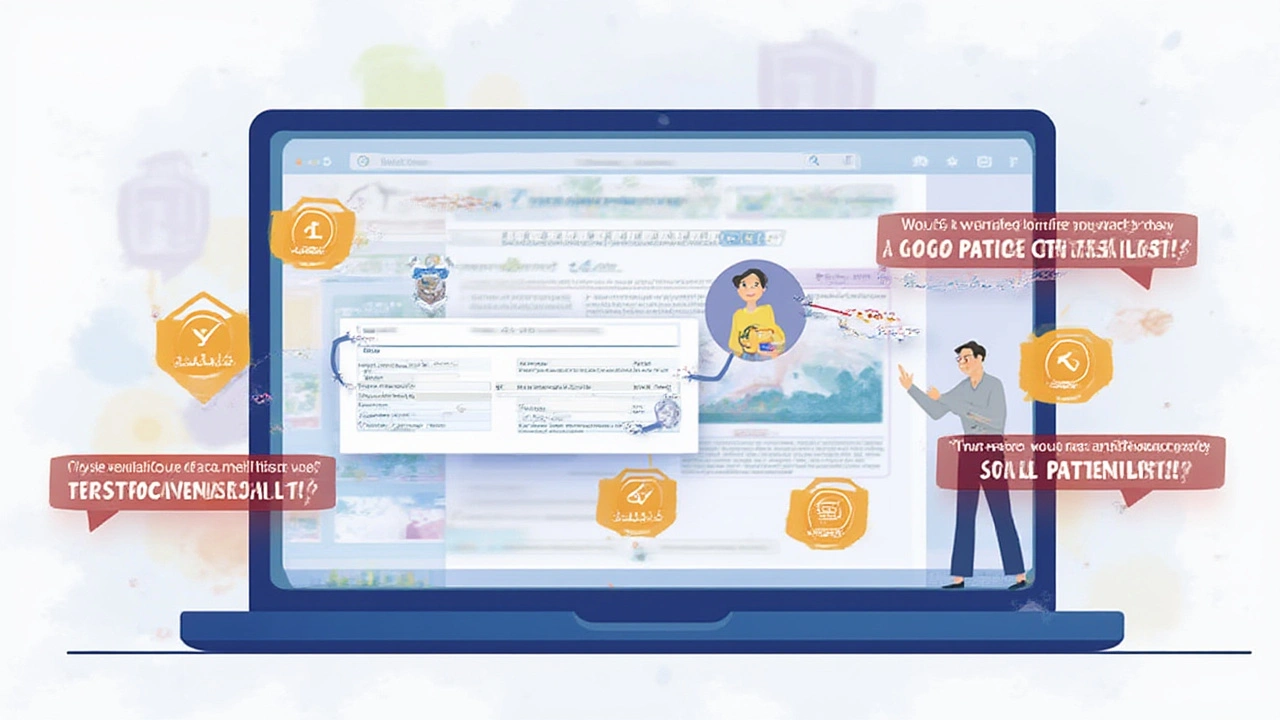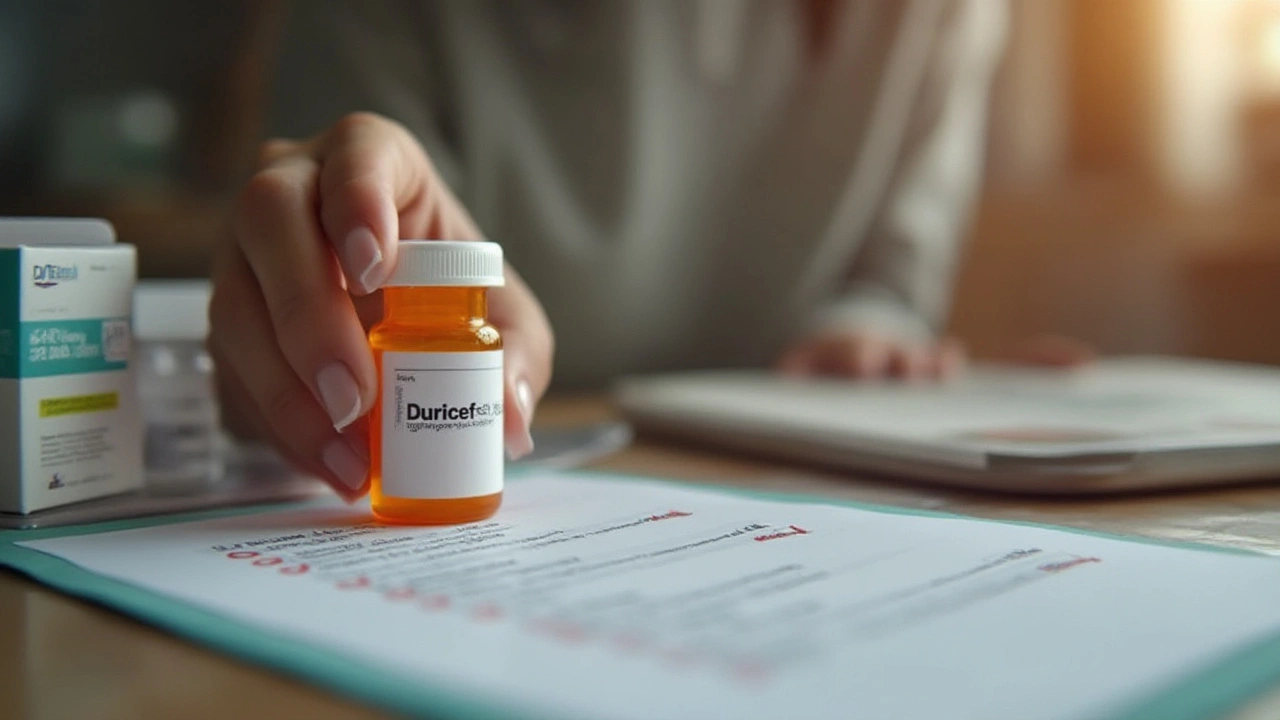Imagine this: it's a Saturday night, your toddler has a persistent ear infection that's not getting any better, and the clinic you trust is closed for the weekend. Even the after-hours pharmacies in Auckland are struggling with stock shortages. You wonder if it's really possible to buy Duricef—a common antibiotic used for everything from urinary tract infections to sore throats—online. You're not alone. Since the pandemic years, buying prescription meds through online pharmacies has gone from “sometimes” to “totally normal” for many Kiwi families. But how do you make sure you’re actually getting the real thing? And not getting scammed—or worse, ending up with ineffective or fake antibiotics that can make matters a lot messier?
Understanding Duricef and Why People Buy It Online
Duricef, also known by its generic name cefadroxil, is a first-generation cephalosporin antibiotic. What does all that mean? It treats bacterial infections in everything from your skin to your bones, urinary tract, throat, or tonsils. In fact, GPs in New Zealand prescribed cefadroxil more than 60,000 times last year, especially for kids with strep throats and adults with UTIs. But it’s not always in stock at every pharmacy. Sometimes clinics run out, or patients need a refill while traveling or isolated at home. This is where online pharmacies come in.
People turn to online purchases for convenience, to avoid uncomfortable conversations at the counter, or even just to save a repeat trip when rural pharmacies don’t carry enough supply. Across the globe, an NZ Pharmac survey found that 1 in 5 Kiwis has tried buying a prescription-only antibiotic online at least once, whether through trusted telehealth providers or international pharmacies. The catch? Not every online pharmacy plays fair. In 2022, the World Health Organization reported that up to 10.5% of antibiotics sold online in the Asia-Pacific region—including New Zealand—were counterfeit or substandard. And even legitimate meds can sometimes lose potency in transit or arrive later than you're expecting, so knowing the ins and outs of the online medicine market is crucial.
Buying Duricef online does have some upsides. You can compare prices, check reviews, avoid awkward pharmacy queues, and often access telehealth consultations. But there are real risks too—like getting fake pills, handing over your data to a scam site, or breaking the law (yup, it’s illegal in NZ to import prescription medication for personal use without a valid prescription). The rules are strict, but they exist for a reason. Doctors and regulators worry about antibiotic resistance—a growing issue worldwide when people misuse or self-dose on antibiotics. In 2024, Otago University’s medical faculty published data showing that 17% of antibiotic resistance cases in NZ hospitals traced back to improper or unverified online purchases of antibiotics.
Some online pharmacies are fully legit, working with licensed Kiwi doctors to review your medical history before approving a prescription. But others, especially those advertising on social media or through pop-up ads, operate in a legal grey zone and often ignore NZ’s Medsafe regulations. Because of these risks, knowing what to look for—and the red flags to avoid—matters.
To keep things super clear, here’s a quick breakdown of Duricef’s most typical uses in New Zealand based on 2025’s Ministry of Health data:
| Condition | Percentage of Cases Treated with Duricef | Notes |
|---|---|---|
| Strep Throat | 48% | Especially in children aged 5–16 |
| Urinary Tract Infections (UTIs) | 36% | Common in both adults and children |
| Skin Infections (Cellulitis, Impetigo) | 14% | Second-line when penicillin can't be used |
| Other | 2% | Including dental and bone infections |
Understanding why people buy Duricef online is only the first piece. Next up? Figuring out how to do it smartly.

How to Buy Duricef Online Safely
The safest way to buy Duricef online is through a verified New Zealand pharmacy—with a real prescription. This isn't just a cautious 'better safe than sorry' thing. Medsafe and Pharmac NZ have strict procedures for a good reason: only pharmacies with official registration can sell prescription drugs like Duricef (cefadroxil). So how do you know if a site’s for real? Look up their pharmacy license number—most trustworthy NZ online pharmacies display this on their home page, and it’s searchable through the Pharmacy Council NZ website. If you’re using a telehealth service, check if their doctors are registered practitioners. Red flag: if a pharmacy says you don’t need a prescription or offers to “arrange one for you for a small fee,” that’s a huge no.
Let’s get into the nitty gritty. Here’s a simple path for buying Duricef online in New Zealand:
- See a registered healthcare provider (GP or telehealth doctor). They’ll assess your symptoms and, if needed, provide a prescription for Duricef (either electronically or on paper).
- Choose a legitimate New Zealand online pharmacy. Some popular ones in 2025 are Zoom Pharmacy, HealthPost, and The Pharmacy Shoppe. These pharmacies require you to upload a valid prescription before processing your order.
- Create an account, upload your prescription, and provide your shipping details. Payment typically happens through secure portals that use two-factor authentication for added safety.
- The pharmacy will review your order, verify your prescription, and, within 24-48 hours, have a pharmacist sign off on it. Track your package online, and most orders in Auckland or Wellington arrive in 1 to 2 days (rural areas might take a bit longer).
What about international online pharmacies? Some Kiwis consider them for savings, but be really careful here. Even big-name global pharmacies like Chemist Warehouse’s Australian division still require prescriptions for antibiotics, and customs can seize packages without one. If your order gets stopped at the border, not only do you risk losing your money, but you can also get flagged for importing unapproved medicines.
How about the price? In NZ, prices for Duricef from licensed pharmacies usually range from $18 for a small bottle to $39 for a month’s supply, plus delivery. International pharmacies sometimes undercut this, but then you gamble with customs delays or, worse, counterfeits. In 2025, the Ministry of Health estimated over 68 cases of imported counterfeit Duricef. A few of these contained nothing more than chalk and sugar. Others had dangerous contaminants. Yes, the risk is real!
Here are a few more signs the pharmacy you’re browsing is reliable:
- They ask for your prescription and medical history.
- They display a valid license number and NZ contact info, with staff available for questions.
- They offer secure payment methods and privacy guarantees. Look for https in the web address.
- Online reviews are mostly positive, and they aren’t too good to be true. Scour places like Trustpilot, Facebook groups, and Reddit for real Kiwi customer feedback.
- They stock other meds, not just hard-to-get or “miracle” drugs.
And here’s how to spot a shady or illegal seller:
- No prescription required or they’ll “provide one” for a fee without a real doctor chat.
- No listed address, or the only contact is a generic web form.
- Prices massively lower than normal (for example, $5 for 30 pills).
- No secure checkout or weird payment requests (like crypto only).
- Fake-looking reviews or none at all.
Many scams rely on urgency (“get it before it sells out!”) or promise fast, no-questions-asked antibiotics. Don’t fall for it. It’s your health at stake. And if you’re buying for a child or a vulnerable adult, you want rock-solid certainty that what lands in your mailbox is the real Duricef—not just a random pill from who-knows-where.
If you’re ever unsure, sites like Medsafe, the Pharmacy Council of NZ, and Consumer NZ all offer guidance, lists of banned or fake online pharmacies, and tips for safe online medicine shopping. When in doubt, talk to your GP. Kiwi doctors are used to fielding these questions now, and most are happy to recommend a good online pharmacy after hours or for refills.
And one tip: once your meds arrive, check the packaging. Make sure it’s tamper-proof, with batch numbers, expiry dates, and the pharmacy’s name clearly marked. Don’t be afraid to call and check if something looks off—your pharmacist would much rather answer “is this legit?” than hear about a reaction from something dodgy.

Tips and Tricks for Getting the Best Out of Your Online Duricef Purchase
Getting Duricef delivered to your front doorstep is definitely convenient, but there are ways to make the experience better, faster, and stress-free. First up: match your prescription size to your needs. Kiwi GPs usually prescribe a standard 7-day course for adults with uncomplicated infections, but double-check your dose. Don’t order extras in case “just in case”—antibiotics aren’t painkillers, and taking leftovers can be risky. Pharmac NZ and your GP can always write a repeat script if you need more.
Next, store your meds right when they arrive. In Auckland’s famous humidity, nothing spoils faster than antibiotics left out of the packet in your kitchen. Read the pharmacy’s advice, but Duricef usually stays stable in a cool, dry spot—think a cupboard, not the bathroom or near the stove. If your child hates the taste (Duricef comes in a pretty tangy suspension for kids), some parents have luck mixing it with a bit of yoghurt or juice, but always finish the whole dose and ask your pharmacist about this first.
Keen on savings? Some insurance plans in New Zealand, like Southern Cross, now reimburse for online pharmacy orders if you keep your tree of order receipts. Always check if your specific policy requires you to use certain approved pharmacies. For those paying cash, pharmacies have started offering loyalty programs—get discounts or free shipping if you’re a frequent customer. (And during Auckland’s wet winter months, free shipping means one less dash across a stormy car park!)
Traveling soon? Order ahead. In 2025, parcel delays average 2–4 days between the North and South Islands, especially in rural districts or during holidays. Set reorder reminders on your phone, or ask the pharmacy to text you when your prescription is up for renewal. Some even contact your GP directly to sort out repeats, which cuts out a layer of hassle entirely.
If you struggle with remembering doses, look for pharmacies that offer medication reminders through their apps—super handy, especially for parents managing multiple meds for kids. And if you’re new to antibiotics or worried about interactions (for example, if you’re also on the pill or have allergies), most NZ online pharmacies have pharmacists on call to answer questions confidentially. Don’t be shy about checking in—they’re there to help.
Here’s something a lot of folks overlook: report side effects, no matter how minor. In NZ, the CARM system (Centre for Adverse Reactions Monitoring) wants to hear about even little things like rashes or upset tummies after antibiotics. These reports help regulators spot bad batches, new allergies, or issues with imported meds. It protects you and other Kiwis.
Finally, if you need to dispose of leftover Duricef, don’t flush it down the loo. Bring it to any pharmacy—they’ll safely dispose of unused antibiotics, so it doesn’t wind up in Auckland’s water supply (every pharmacist, from Takapuna to Pukekohe, knows the drill).
If you stick to these steps, buying Duricef online can be just as safe as popping into your local chemist—sometimes even easier. With legit pharmacies, a proper prescription, and some smart planning, you don’t have to leave your health to chance.

